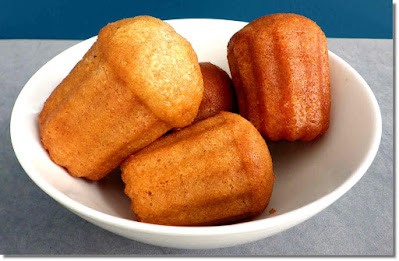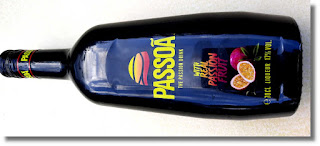Passoã Babas
So you've bought a bottle of Passoã to make some porn star martinis at home (it's the most popular cocktail in the UK, apparently) but now what do you do with the rest of the bottle? Well you could make a variation on the classic rum baba. At least, that's what I did.
The classic baba is made with an enriched yeast dough soaked in a rum syrup and for many years I thought that everyone made them that way. Eventually a kindly French person took me aside and let me into a secret: a lot of babas are made using baking powder. It's a very quick and easy way to produce babas and I enjoy them just as much as the traditional version.
I used canelé moulds to make the babas simply because I like the shape but small savarin moulds are more usual. I put enough mixture into the mould to make sure that it bulges from the top when cooked. You could be a little more restrained if you like.
If you want to make something closer to a classic baba using this recipe, then omit the vanilla, possibly reduce the sugar a little in the cake, don't sprinkle with Cointreau and replace the passoã and vodka in the syrup with dark rum and the lime with lemon. Alternatively, don't worry about the tradition and just use whichever flavours you prefer. This is a very forgiving recipe and the baba police rarely arrest anyone for not sticking to the rules.
This will produce at least 8 babas using moulds with a 100 ml capacity, although it does depend on how much overspill you allow. Either serve on their own drizzled with any spare syrup or add a little cream, custard (OK, crème anglaise) or ice cream alongside. In the spirit of the famous martini, you could serve with a small glass of something alcoholic and sparkling.
For the babas:
120 g golden caster sugar
3 eggs
50 g butter, melted and cooled a little
150 g plain flour
1 tsp vanilla powder or vanilla extract
2 tsp baking powder
3 tbsp Cointreau or triple sec (I particularly like the Blood Orange Cointreau)
For the syrup:
200 ml water
200 g sugar
Juice of 1 lime
50 ml passoã
30 ml vanilla vodka (or use plain vodka and a dash or two of vanilla paste or extract)
Preheat the oven to 180°C. Butter the moulds well.
Whisk the eggs and sugar together thoroughly until the sugar has dissolved and the mixture is pale and increased significantly in volume.
Thoroughly beat in the butter, flour, vanilla and baking powder.
Pour the mixture into the moulds. I prefer to have the moulds about two-thirds full but stop at about half full if you prefer a tidier result. Bake in the oven for about 15 minutes. Check that a knife point comes out clean but don't worry if the cakes look a little pale. For this recipe it's important to avoid baking for too long.
While the babas are in the oven make the syrup by dissolving the sugar in the water over a low heat with lots of stirring, then increase the heat and boil for 2 minutes or so. Add the passoã, vanilla vodka and lime juice and continue boiling for another 4 or 5 minutes. Keep the syrup warm until needed.
Once the babas are cooked, remove them from their moulds while they're still warm, place in a bowl and sprinkle with the Cointreau or triple sec.
After 5 minutes or so, once the babas have absorbed the sprinkling of Cointreau, pour over most of the warm syrup. Keep a little of the syrup back, allow it to cool and store in the fridge. Pour a little of this chilled syrup over each baba just before serving.
The babas will keep well for a few days in a closed container in the fridge although they might lose their shape just a little.






I didn't know you could make babas with baking powder; so much easier. I have a canalé mould, so definitely one to make.
ReplyDeleteThis seems to be something people like to keep to themselves. I'm sure that if you buy a baba in a restaurant or boulangerie in France then they'll be the traditional yeast baba but if people make them at home, then it seems that there's a fair chance they'll reach for la levure chimique. But nobody told me that for years.
DeleteI already have a small collection of bottles of alcoholic beverages I had never heard of until I read about them in your posts so why not one more?!
ReplyDeleteI have never made babas and wouldn't have thought to try if it required yeast but this sounds easy and looks amazing. Off now to Intermarché……….they have a weird and wonderful selection of liqueurs so fingers crossed for this one!
I suspect that Passoã would be a very obscure liqueur in the UK if the porn star martini hadn't become such a popular drink. I'm not sure that the same is true in France. Leaving aside kirs (and I don't like the thought of leaving them aside rather than drinking them) I've recently read that the most popular cocktail in France is still the Mojito. Nothing wrong with that but it won't do anything to make Passoã more widely available although, as you say, there can be quite a weird and wonderful selection in French supermarkets.
DeleteWell can you believe it - Intermarché did have several bottles of Passoa!
DeleteI've just had a quick look and there are several French sites with a recette for le porn star martini and so maybe it's not just the UK that loves it so much.
DeletePhil, your babas look wonderful! I have no canelé moulds so would probably bake mine in a muffin/cupcake tin, until such time as I convince myself I've abstained long enough from buying any more seldom-used pieces of specialty kitchen equipment! I will try them side-by-side with the yeasted version for comparison.
ReplyDeleteThe canelé shape certainly isn't traditional for babas but I just like it. If you try these alongside the yeasted version you'll notice a difference in texture but, personally, I like the texture of the baking powder version. People who love the classic baba might not agree.
Delete